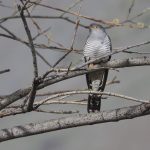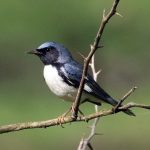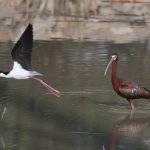Alaska’s two United States Senators and groups including the Alaska Federation of Natives and the Association of Village Council Presidents are working to get the new requirement that subsistence bird hunters in Alaska be required to buy a federal Duck Stamp, the proceeds of which go to conservation, overturned. Should subsistence hunters, many of them Native Americans, be required to pay $15 each year to hunt ducks, geese, and other birds?
Recent Posts
 The time of the CuckooBy David T
The time of the CuckooBy David T Podcast: Bird Nerd Book Club; The Secret Perfume of BirdsBy Hannah
Podcast: Bird Nerd Book Club; The Secret Perfume of BirdsBy Hannah Species Spotlight: Siberian Long-tailed RosefinchBy Kai Pflug
Species Spotlight: Siberian Long-tailed RosefinchBy Kai Pflug My 10 Favourite New World WarblersBy Leslie Kinrys
My 10 Favourite New World WarblersBy Leslie Kinrys Ten birds seen in my parents’ garden in Northern Germany and in ShanghaiBy Kai Pflug
Ten birds seen in my parents’ garden in Northern Germany and in ShanghaiBy Kai Pflug The Gang’s All HereBy Paul Lewis
The Gang’s All HereBy Paul Lewis It Only Took Fifteen YearsBy Faraaz Abdool
It Only Took Fifteen YearsBy Faraaz Abdool
Welcome to 10,000 Birds!
Learn about our site and writers, advertise, subscribe, or contact us. New writers welcome – details here!
Posting Calendar
| DAY | WRITER(S) | SERIES |
|---|---|---|
| MON | Kai (w) | Birding Lodges (w) |
| TUE | Donna (m) Susan (m) Hannah (m) Fitzroy (m) | Bird Guides (w) |
| WED | Leslie (bw) Faraaz (bw) | Ask a Birder (w) |
| THU | Paul (w) | Birder’s Lists (w) |
| FRI | David (w) | Species Spotlight (w) |
| SAT | Peter (bw) Luca (bw) | From the Archives (w) |
| SUN | Clive (w) Valters (bw) | Three Photos (w) |
| w weekly, bw biweekly, m monthly | ||
| Any time: Jason, Mark, John, Sara, Rolf, Dragan | ||
See here for info on the writers.
Newsletter
Signup and receive notice of new posts!
Thank you!
You have successfully joined our subscriber list.











Is subsistence still a legitimate argument? This is the same language that’s used to justify “subsistence” whale-hunting.
I have sympathy for indigenous people and their way of life, but no one is saying they have to stop only that they pitch in for conservation, which doesn’t really seem like that much to ask.
And is Alaska is concerned about it being a hardship, perhaps the state should pick up the tab with some of that sweet sweet oil royalty money they’re rolling in.
No, they shouldn’t. Many who rely on subsistance hunting, do so because of little or no income. I don’t have sympathy for indigenous people and their way of life. It’s a great life that they chose to live.
Nate, come to Alaska and be an Alaskan and know what’s going on in Alaska before you comment on such things.
@Dave: Seeing as we are talking about a national program and a national resource on a blog that encourages an open exchange of ideas I think that Nate (or anyone else) can feel free to comment on this issue without visiting Alaska.
I’d love to go to Alaska!
I guess I don’t see the difference between subsistence hunters and recreational hunters in that both have an interest in conserving what is a finite resource. If the state wants to cover their share for cultural reasons, then I don’t see a problem with that. But since as Corey says, the resource itself requires a nation-wide conservation initiative, I don’t see why anyone should be able to waive that responsibility.
Lot’s of unanswered questions that makes it hard to take a stance here.
1.Why the change of heart, what convinced law makers to remove the
grandfather clause for these people.
2.If these folks are “NATIVE” Alaskans I expect their way of life does more to promote conservation than most conservation clubs.
Are they Native Alaskans?
3. How many of these folks are there, Are their numbers growing?
4. What kind of restrictions (Hunting area, species,etc)???
While I certainly agree that any comments should be welcomed,I expect Dave would be and should be more knowledgable on this topic.
@Wes (aka Dad):
1. Everyone has to buy duck stamps to hunt birds. Why should Alaskans get to hunt birds for free?
2. Not at all true (or at least not necessarily). And the massive amounts of land that duck stamps have paid for allow the waterfowl that breed up north (that the Alaskan subsistence hunters want to hunt) to survive the winter and proliferate.
3. No idea?
4. Not sure what restrictions you are referring to.
And while it is nice to think that local folks on the ground are the experts this is not always the case.
My first reaction was that $15/year is nothing to kick up a fuss about. Aren’t there more important things to worry about?
But that may be my privilege talking. And it may also be about the principle of the thing.
I’m a little surprised this is a State, and not Indian, issue. I’m from Canada and I know we do our Indian affairs differently, but I was immediately troubled by the lumping-together that’s going on here. Are any non-Indian Alaskans getting special treatment on this? Why?
But then, Alaska is so far from the rest of the U.S., I guess it’s not realistic to say the non-Indians could just up and move if they don’t like their current conditions (which is what I’d been thinking).
I wonder, are the particular birds being hunted in Alaska profiting from the conservation activities the Duck Stamps are funding? Or is this a case of one State paying for another State’s problems?
More questions come to mind, like what justification was given to exempt Alaskans before, and is there any other subsistence bird hunting (native or non-native) going on in other provinces (and if so, are they exempt too)?
I think it’s a complicated issue…
/oops, I mean “is there any subsistence hunting going on in other *states* … 😛
The restrictions I asked about was just a general question. Arethe substenance hunters restricted at all on what species that take,or a limit on how many they take, or on size/sex etc.
On the conservation comment. Willing to bet their carbon footprints are way less than most of us. I also expect (If NATIVES)that they use a lot more of their prey than other hunters.
I think that Nicole hit what I was trying to say pretty well.
Nate – the differance between subsitance hunters and sportsman hunters is subsistence. They rely on what they hunt where sportsman hunters do it for sport. In most of these communities there are no roads connecting them to the outside. The only way to access them is either by air or water. That goes for any fuel, groceries, etc. A gallon of milk can run $10 – $15, a loaf of bread $8 – $12 and fuel, well we won’t go there. $15 a year might not be much to you and I, but to these people, yes.
Alaska is the only state where 3/4 of it’s population can’t drive to its own state capital without going through a foreign country. If I were to drive to Juneau from Anchorage, I first would have to get a passport.
The hunting of wild birds are regulated by both USF&W and ADF&G hunting regulations to include what can be used to hunt, what and how much can be taken and what they must be used for. Here’s a link to ADF&G on subsistence hunting http://www.subsistence.adfg.state.ak.us/geninfo/regs/subhunt.cfm
I’m not sure in numbers how many people this would effect but take into consideration that Alaska is 2/3 the size of the continental U.S. and has a population of about 675,000. Maybe at most 1/3 of that population would be able to hunt legally for subsistence.
Corey – if you’re inviting an open exchange of ideas on such a large issue, one should know what they are commenting about before doing so.
Nate – come to Alaska and I would be proud to show you the real Alaska.
@Dave: The issue is whether or not people should pay $15 a year to hunt birds. You think they shouldn’t and Nate thinks they should. Just because you disagree does not mean Nate does not know what he is talking about.
You think that those who live in rural areas can’t afford the cost of a gallon of milk to be able to hunt birds and Nate thinks that bird populations can’t be hunted and sustained without the hunters giving back to bird conservation.
Nate has suggested that if the state of Alaska wanted to use oil revenue to pay for subsistence hunters’ duck stamps that the state should be able to do so. That seems like a reasonable approach to me; if Alaska wants special treatment for its citizens the state should pay for it. After all, it is not as if the federal government is lining up to give working class New York City dwellers a $15 refund on their Metro Cards even though NYC is unique in the United States in that those who are working class have to use the subway because owning a car in NYC is beyond their means.
Alaska already gets $1.82 in federal money for every $1 paid in federal taxes. Enough is enough.
Just my 2 cents, but I wonder how many of the native alaskan are actually paying the duck stamp right now. I mean, it’s not like there is cops everywhere in Alaska, and I suspect the most isolated population of Alaska don’t feel the need to buy the stamp, just because it is not enforcable.
Corey has essentially summed up my argument. And I get that Alaska is big, I don’t really see what that has to do with anything. The birds still need to be managed and it’s in the interests of the subsistence hunters as well to pitch in for their conservation.
If the state wants to partially or wholly subsidize the cost of the stamp, then that’s fine. According to the AFD&G link you posted, they already have a system in place to do just that with state fees for low-income Alaskans and I assume subsistence hunters would probably apply.
From the USF&W website for the Federal Duck Stamp Program
Alaska Refuges Funded in Part by Federal Duck Stamps
There are no National Wildlife Refuges funded by Federal Duck Stamps in the state of Alaska at this time.
Here’s the link; http://www.fws.gov/duckstamps/Conservation/states/Alaska/Alaska.htm
Laurent, the 4 largest National Parks are in Alaska. Wrangell-St Elias Is over 8,000,000 acres. There aren’t enought AK State Troopers or AK Wildlife Troopers or USF&W Law Enforcement agents to patrol such an area. You probably can get away with a lot, but I don’t think it’s worth the risk.
Corey, the New York Subway System is owned by the City of New York. Get with your elected officals on providing transportation for free. The State of Alaska’s ellected officals are arguing for their citizens.
Nate, good job. You found something that I missed in my own link for referance.
@Dave: The waterfowl in Alaska (mostly what is being hunted) migrate there from the lower 48. Almost all of them winter on NWRs funded by duck stamps. NWRs in Alaska are not funded by duck stamps because pretty big chunks of land are already federally-owned refuges.
Glad that the state already has a program to help fund low-income hunters; it shouldn’t be too hard for them to expand that to the duck stamp.